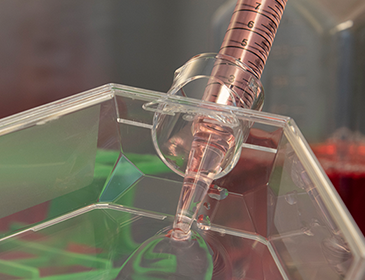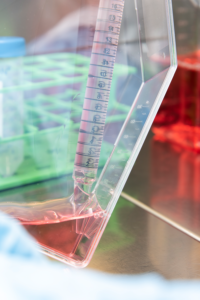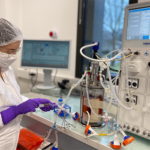The quarterly scientific journal

Characterization of lentiviral vectors and RCL “pool” assay
The development of safe gene therapies is at the heart of our commitment at Clean Cells. We manifested an interest for Advanced Therapy Medicinal Products very early on and consequently invested substantial resources to develop and validate suitable methods according to ICH Q2R1 guidelines for the safe development and manufacture of cell and gene therapies. In particular, Clean Cells has partnered with customers on numerous gene therapy testing projects, including dozens of lentiviral vectors and CAR-T products.
Several methods have entered our portfolio of GMP assays for the testing of such products and related End-Of-Production cells, including:
- Replication-competent lentiviral particles detection assay (RCL assay) for vector lots and EOP cells
- P24 ELISA assay or RT-qPCR assays (targeting pol or VSV-G sequences) endpoint read-out
- Wild-type HIV-1 strain as positive/inhibition control (handled in BSL-3 laboratory)
- Preliminary toxicity study to adjust conditions to toxic vectors
- Direct qPCRs assays targeting HIV-1 genome (Psi, GAG, pol)
- Vector Copy Number determination (VCN by qPCR SYBRGreen or Taqman probes technologies)
- Determination of physical particle titre (PP/ml) for HIV-1-based lentiviral vectors preparations by quantification of the HIV-1 P24 antigen by ELISA technique
- Infectious titration of lentiviral vectors preparations (ig/mL) through HCT116 cells transduction (4 days) and determination of vector copy number by duplex qPCR with TaqMan Probe technology
- Residual HCP for HEK293 and HEK293T cells
- Residual DNA testing (host cells DNA, exogenous sequences, plasmids) including:
- Host cell DNA: HEK293, HEK293T, Sf+, Sf9 cells
- Viral sequences and genetic elements of interest: E1A gene from Adenovirus type 5, large T antigen from SV40 virus, Psi, GAG and pol sequences, VSV-G gene from VSV virus, kanamycin/neomycin gene
- Biosafety testing according to Ph.Eur. and FDA/USP
Please note that Clean Cells also offers custom assay development services for characterization or release purposes.
The company has now developed and validated a novel method to streamline replication competent lentiviral particles testing under GMPs, known as the RCL detection assay.

RCL assays can indeed be burdensome with dozens of flasks being handled along the 28 days of culture and often fail to include the maximal volume required by the guidelines.
Protocol optimization has been performed via “pairwise pooling” and an increased rate of attrition of non-replicative particles. It allows for a reduction of sample handling time and costs, while maintaining representativeness of sampling and assay sensitivity and robustness.
Testing of volumes up to 300 ml (450 µg of P24) of vector preparation in a single assay is made possible, in accordance with the maximum volume requested by the guidelines, thus simplifying testing strategies at an industrial scale with larger volumes.
This novel protocol has been validated according to Good Manufacturing Practises and follows relevant international guidelines regarding RCL testing.
Feel free to reach out to our team to receive additional information on the technique and specifications.
Please note that Clean Cells also offers GMP cell banking services and associated biosafety testing and has manufactured several HEK293 and Sf9 banks to produce gene therapy vectors. Additional information is available here.
News - February 2021
 Joseph JAMMAL, Clean Biologics’ New CEO
Joseph JAMMAL, Clean Biologics’ New CEO
Clean Biologics benefits from the cumulated experience of daughter companies Clean Cells and Naobios and takes part in the development of tomorrow’s medicines. The strategic ambitions to the group have consistently grown since its creation in 2018. To strengthen the existing executive team, Joseph JAMMAL was appointed group CEO last January.
 New Bioreactors on Process Development – Increasing flexibility and capacity
New Bioreactors on Process Development – Increasing flexibility and capacity
To continuously improve Process Development, Naobios acquired three new bioreactor control systems which increase flexibility and capacity and rely on independent monitoring and control of vessels up to 40L.